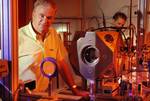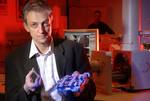Master's tracks
The Energy Technology group participates in three Master Tracks:
- Thermo Fluids Engineering (TFE)
- Sustainable Energy Technology (SET)
- Micro and Nano Technology (MuNT)

Thermo Fluids Engineering (TFE)
Many production processes are based on fluids or gasses flowing in installations, undergoing temperature changes and chemical reactions that are needed to achieve the final product: a raw material, an end product or energy in a useful form. The design and optimization of these installations, which can be found in the process industry and energy industry, are vital for Europe’s economy, the more so now that new regulations with respect to energy use and harmful emissions are becoming effective. The same kind of processes, but on a smaller scale, play a role in cars, domestic burners, solar panels, heat exchangers and even in humans during surgery and medical treatment.
In this Master track the student will learn how to design and optimize the mechanical constructions for these installations in relation to the desired flow behaviour and heat transport. The student will use a combination of advanced experimental methods, state-of-the-art numerical models and new theoretical techniques to tackle important problems. A fundamental understanding of the chemical and physical processes occurring in the process installations is essential. The industrial problems must be translated to scientific questions before a solution can be found. To investigate these questions experimental set-ups - scaled-down versions of the practical applications - are developed and built, and essential parameters are measured to determine the overall behaviour of the system. In combination with models of the process and computer simulations these measurements will provide input for new and improved designs and for design tools. The end result of this approach is, on the one hand, scientific insight in the processes worthy of being published in high-quality scientific journals and, on the other hand, a general approach to solving specific industrial problems.
Visit the educational website for more information on the master track Thermo Fluids Engineering.

Sustainable Energy Technology (SET)
The program trains engineers with broadly based knowledge of energy technology. To provide a good technical base, the program starts with a number of basic courses such as physical transport phenomena. This knowledge is applied in the specialized courses in the field of energy from biomass, solar and wind energy, hydrogen as a sustainable energy carrier and intelligent electrical networks. This fundamental knowledge is a primary requirement for evaluation of the different technologies and assessment of their feasibility.
Also required is an understanding of the energy infrastructure and the community in which the technology is to be applied. The student will therefore take courses in which the introduction of technical innovations in the community is a central element, together with attention for economics and consumer behavior. The student will learn how to apply the knowledge that he or she has gained in projects involving both the system-based and interdisciplinary approaches. Elective courses chosen together with the his or her supervisor allow the student to gain more specialized knowledge, which will be needed for the final project and the internal research traineeship.
Visit the educational website for more information on the master track Sustainable Energy Technology.

Micro and Nano Technology (MuNT)
In this Master track the student will learn about the mechanical aspects of micro-systems and thin films, how to make parts with micro and nano-precision and assemble them. In addition, the student will be taught how to apply the technologies and use the equipment to study the results: in situ testing in electron microscopes, for instance. The lifetime, dynamical aspects, reliability and testing of these properties is not simply a one-to-one scaling down of the macroscopic systems. The special problems related to energy processes, for instance cooling, in micro-systems and nano-systems will be taken into account. In micro-fluidic systems the influence of capillary action and the use of membranes differs from that in macro-systems. New models, new processing techniques and new computational tools are needed to tackle the many challenging problems.
Visit the educational website for more information on the master track Micro and Nano Technology.